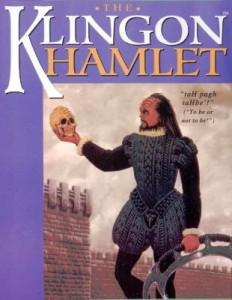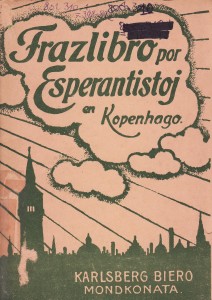Saluton, Language Nerd!
If you don’t recognize the greeting, you obviously don’t know Esperanto. Most other folks don’t either; it just didn’t seem to catch on. But I’m wondering: has there ever been a completely contrived language that hit the big time and became the common tongue in some corner of the world?
-Robbie
***
Bonvenon, Robbie!
Not yet. But they get farther than you might think, and there are waaaaaay more of them than most people would imagine. People make constructed languages (shortened to “conlangs”) for many many reasons, and in every category, a few have found purchase in the outside world.
Now, many conlangers build languages just for the joy of the thing, but those of us with notebooks full of abjads and phonetic charts under our beds have removed ourselves from this competition, in that “hitting the big time” kinda requires people to be trying to speak your stuff. So we’ll ignore that chunk of the population and instead stick to the select, those who’ve found (relative) fame and fortune through conlanging.
And now the categories!
Award for Languages Built as Part of a Larger Fantasy or SciFi World
The Runners-Up: Quenya, one of the languages of the Elves from The Lord of the Rings, by J.R.R. Tolkien, and the standard against which all other fantasy languages at set; and Dothraki, initially imagined in George R.R. Martin’s Song of Ice and Fire books but actually built up for the TV show by the one and only David Peterson.
And The Winner Is: Klingon from Star Trek, constructed by Marc Okrand. I was never a big Star Trek fan, myself, but boy do I admire the Klingon Language Institute (yes, it’s a thing). They organize a huge community, holding conferences, reading each others’ epic poems, and translating Shakespeare. And they get major points for their willingness to do more work to get their language out to a wider audience. Most conlangs these days are internet-bound — you wanna learn Dothraki? Then you’d better be online. But the KLI will send you an eleven-lesson postal course. Now that’s dedication.
Award for Languages Built to Try and Change Our Way of Thinking
The Runner-Up: Newspeak, from George Orwell’s 1984. Not that lots of people try to speak this one, but boy is it well-known.
And The Winner Is: Ithkuil, by John Quijada. Newspeak and Ithkuil come at the Strong Sapir-Whorf hypothesis from opposite angles. Ol’ SSW is the idea that language constrains thinking, which shows up in Newspeak negatively – if Big Bro doesn’t give you a word for something, you’re unable to think it.* But Ithkuil sees the opportunities of the SSW hypothesis. Its enormous grammar requires the speaker to think through every aspect of their intended sentence in exactitude, leading to a conlang that isn’t useful as a language so much as for mental discipline. This is the winner because it is extremely well-known in certain circles, and by “certain circles” I mean “freaking crazy Russians.”
Honorary Award for Extreme Awesomeness
Korean. The language is not constructed – it’s been growing naturally for thousands of years — but the script, as I’ve mentioned before, was put together by the Man of a Million Talents, King Sejong the Great. When he realized that borrowing Chinese characters was not working out for his people, he sat down,** learned some phonology, and made a breathtakingly logical script now used by some 50 million people. So not a fully constructed language, but the parts that are constructed surpass all others a dozen times over in number of people using them. FURTHER PROPS FOR KING SEJONG, JUST CAN’T STOP GIVING THE MAN PROPS.
And now, what we’ve all been waiting for…
Award for Languages Built to Try and Bring the World Together
The Runners-Up: There are many of these, which is both a hopeful sign of how people want to come together and a tragic/amusing irony as everyone bickers back and forth about whose language is best. Interlingua is a big one, and Uropi is interesting because it’s based on the ancient reconstructed roots of Indo-European languages.
And The Winner Is: Esperanto. You said it didn’t really catch on, and it’s true that it hasn’t brought about global harmony as yet — but you’ve heard of it, which I’m betting is more than you can say of any other language in this category.
L. Zamenhof put Esperanto together about 130 years ago, and it waxed and waned in popularity during the 20th century — but since the rise of the internet, it’s been booming. Exactly how many people speak it is fuzzy, but the higher estimates put it at two million, with maybe a thousand of those being from-the-womb native speakers. Global English has shrunk the practical need for a constructed global language, but Esperantists still argue for their tongue as a neutral communication medium, not tied to any single culture and thus more equitable when people from opposite sides of the world get together. (Though the counter to this, and part of the reason so many follow-up conlangs have sprouted, is that Esperanto is much more a pan-European language than pan-Earth.)
The genius of Esperanto, though, and the reason its many imitators remain wanna-bes, is that Zamenhof also built it as a language of the arts. It’s easy to rhyme. It’s easy to build a meter. It lends itself to lyrical turns of phrase, and since words can be switched from nouns to verbs to adjectives to adverbs and back in no time, it just begs you to poetically reconsider your parts of speech. Most connect-the-world languages simply demand you learn them, with the only motivation the implicit guilt-trip: if you don’t, and the world doesn’t unite, we blame you! Esperanto makes a global community seem worth being a part of. It invites you to come and play. And that’s why Esperanto is a winner.
Audiaŭ!
The Language Nerd
*Steven Pinker’s soothing of Orwell’s fears is not nearly as well-known as it should be.
**Alright, and got a whole bunch of other people to help him, but WHATEVER.
Got a language question? Ask the Language Nerd! asktheleagueofnerds@gmail.com
Twitter @AskTheLeague / facebook.com/asktheleagueofnerds
Referrific!
No discussion of conlangs is complete without a link to Mark Rosenfelder’s Language Construction Kit, for those who want to try it out themselves.
Esperanto can be learned here, and here’s a podcast about it from the lovely 99% Invisible. And books, poems, and songs are published in Esperanto constantly – check it out.
The Klingon Language Institute
Ithkuil, and a second link to that killer New Yorker article
Dothraki, Quenya, Interlingua, and Uropi
Checked the South Korean literacy rate from the CIA World Factbook, and education is damn comprehensive there, but I’m skeptical of the CIA’s research methods – they list North Korea as having a 100% literacy rate. CIA, are you letting countries just self-report into your factbook?
Wikipedia tells me that NK defines literacy as the ability to write “Kim Il-Sung,” which would explain the high scores, but the source they cite doesn’t actually say that, and I can’t find support anywhere else that’s more than a link back to Wiks. If anybody knows about this, info is hereby requested!
UPDATE 10 July 2014: Edited this one pretty heavily for clarity, detail, and humor. The KLI was down when I was originally researching this, so I had about a sentence explanation of a great org. Plus found that kickass Hamlet cover, and went into more detail about Esperanto, too. Still no info on Korean literacy tests, y’all, I’m waiting on tenterhooks here.


Esperanto hasn’t yet gained the recognition it deserves. However, all things considered, it has actually done amazingly well. In just over 125 years, it has managed to grow from a drawing-board project with just one speaker in one country to a complete and living natural language with around 2,000,000 speakers in over 120 countries and a rich literature and cosmopolitan culture, with little or no official backing and even bouts of persecution. It hasn’t taken the world by storm – yet – but it’s slowly but surely moving in that direction, with the Internet giving it a significant boost in recent years.
If you’re interested in on-line learning, and you don’t have to be a nerd, take a look at http://www.lernu.net
[…] areas that I’ve never even mentioned (like, uh, all of morphology). Just for a sample, here’s a few posts about English–only areas, and here are some that cross […]